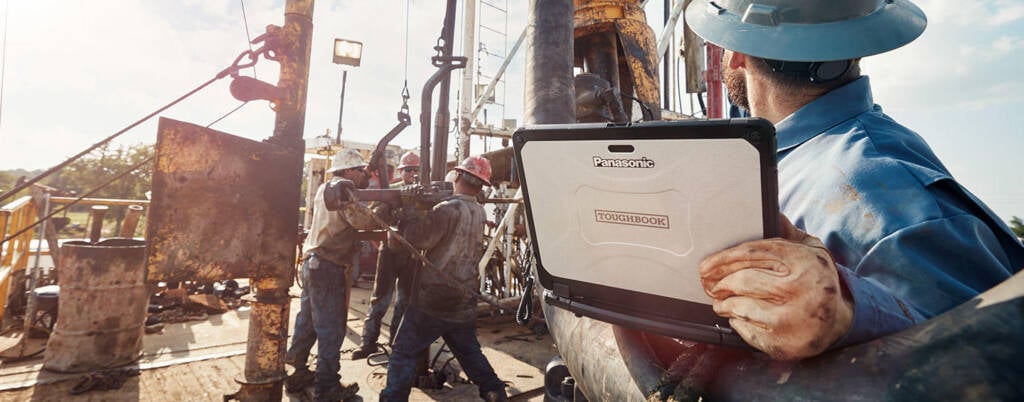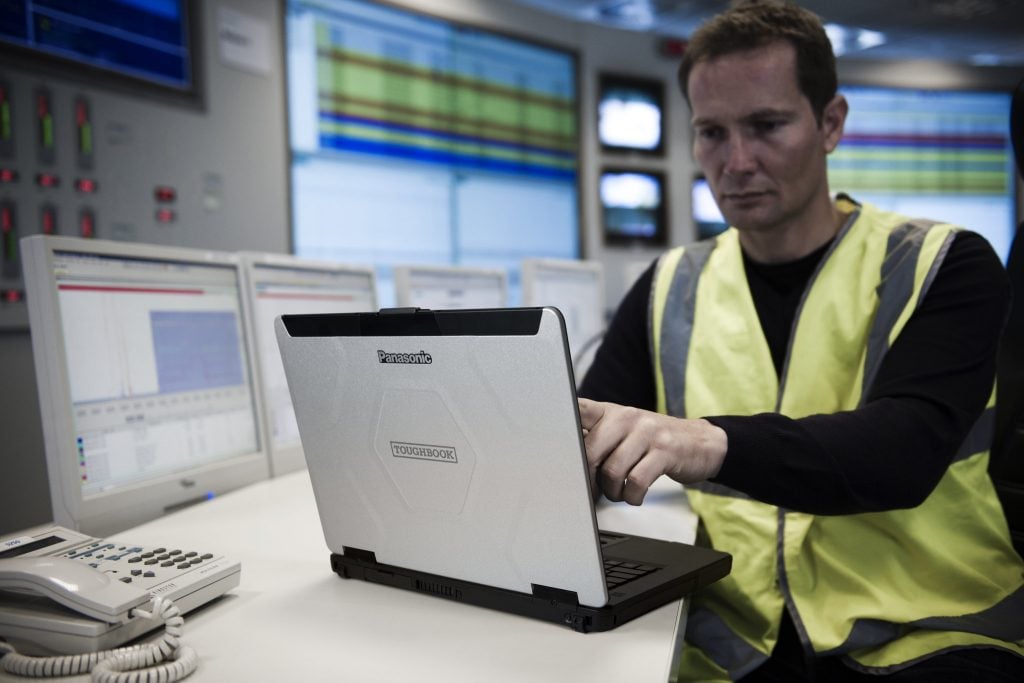The Power of Mobile Computing Devices
Mobile computers are robust, durable devices designed for use in a wide variety of environments, both indoors and outdoors. These versatile tools can be used by employees within the enterprise or while traveling. They can be mounted on a forklift, installed in a long-haul truck, worn on the arm of a warehouse worker, or used as tablets with large screens ideal for customer service roles.
These rugged, enterprise-class devices offer extensive wireless communication options and advanced data capture capabilities, allowing mobile workers to exchange real-time, business-critical information anytime, anywhere. They are equipped with built-in systems for wireless connectivity, such as Wi-Fi and Bluetooth, enabling easy data transmission.
Mobile computers can collect and process various types of data, including barcode scanning and radio frequency identification (RFID) tag reading. This capability is especially valuable in industries such as retail, warehousing, delivery services, and healthcare, where rapid and efficient data collection and transmission are essential.
Often referred to as enterprise-class devices, mobile computers are built for large organizations. They feature strong processing power, ample memory, and clear displays, allowing them to run complex applications and tasks. Unlike consumer devices, they are designed to withstand harsh conditions, including dust, water, and extreme temperatures.
These devices are crucial because they enable workers to access and update vital business information in real time, regardless of location. This leads to better decision-making, increased work efficiency, and improved customer service. Essentially, mobile computers are like advanced smartphones, capable of performing a wide range of business functions anywhere, anytime.
Businesses of all sizes are adopting mobile solutions across various operations, viewing mobility as a strategic advantage and seeking broader applications across more functions.
Mobile Computing Applications
Mobile computing applications are tailored to address specific business challenges. Here are some examples of industries where mobility solutions are effectively utilized:
Energy and Utilities
Mobile solutions can aid utility companies in maintaining their power lines. For instance, a utility company responsible for electricity supply might have numerous power lines spread over a large area. Traditionally, workers would manually inspect each line and return to the office to log their findings. With mobile computers, this process becomes more efficient. Workers can input data directly into the device while on-site, including the condition of the power line and any necessary repairs.
Equipped with industry-specific applications, mobile computers can help identify potential issues, such as wear and tear or weather damage. GPS applications can guide workers to the exact location of each power line. With internet connectivity, data entered by workers can be sent back to the office in real time, allowing for quicker decision-making. If a power line is damaged, a repair team can be dispatched immediately.
Mobile computers also facilitate communication, allowing workers to quickly contact supervisors for assistance. These devices enhance the efficiency, accuracy, and timeliness of power line inspections and maintenance.

Manufacturing
Mobile computers provide manufacturers with insights into their processes and quality metrics.
- Real-Time Data Collection: Mobile computers collect real-time data at various manufacturing stages, which can be analyzed to identify bottlenecks, inefficiencies, and issues needing attention.
- Quality Control: Equipped with barcode and QR code scanners, mobile computers track product quality at each stage. If a defect is found, manufacturers can trace it back and take corrective action.
- Improved Efficiency: Quick data capture and access reduce manual data entry time, enhancing manufacturing efficiency.
- Better Decision Making: Real-time insights help manufacturers make informed decisions, track performance, and adjust strategies based on actionable data.
- Enhanced Communication: Mobile computers improve communication among staff, allowing for task assignments, status updates, and messaging, which boosts coordination and productivity.
By optimizing processes, improving quality control, enabling data-driven decisions, and enhancing communication, mobile computers increase productivity and profitability in manufacturing.
Transportation and Logistics
Mobile computers offer postal companies a reliable way to provide proof of delivery.
- Real-Time Tracking: Integrated GPS technology allows for real-time package tracking, eliminating delivery disputes.
- Signature Capture: Recipients sign on the mobile computer's touchscreen upon delivery, providing digital proof of receipt.
- Barcode Scanning: Scanning barcodes confirms package delivery to the correct address and updates the delivery status in the system.
- Data Synchronization: Delivery data, including time, GPS coordinates, and signatures, syncs with the central system for easy record retrieval.
- Higher Efficiency: Automating proof of delivery eliminates paper records, making the process more efficient, accurate, and reliable.
Mobile computers provide logistics companies with comprehensive solutions for tracking packages and verifying deliveries.

Retail
Mobile computers enhance the retail environment by enabling mobility for managers and employees.
- Improved Customer Service: With mobile POS systems, managers can assist customers throughout the store, performing tasks like price checks, stock availability checks, and transactions on the spot.
- Increased Sales Opportunities: Managers can identify upselling or cross-selling opportunities and suggest related products or services to customers.
- Efficient Inventory Management: Mobile computers track inventory in real-time, updating records instantly to reduce stock-out or overstocking risks.
- Streamlined Operations: They automate processes like returns, exchanges, and refunds, reducing wait times and improving service.
- Data Insight: Mobile computers collect data on customer behavior and store performance, aiding decision-making and strategy implementation.
In retail, mobile computers transform operations, making them more efficient, customer-friendly, and profitable.
Healthcare
Mobile computers reduce medical errors and securely update records at the bedside.
- Real-Time Data Access: Immediate access to patient data, such as medical history and lab results, is crucial for accurate treatment decisions.
- Barcode Scanning: Scanning patient wristbands with barcodes provides instant access to records, reducing errors like medication mix-ups.
- Data Entry: Bedside data entry minimizes forgotten or misrecorded information, reducing medical errors.
- Security: Robust security features protect sensitive patient information, ensuring only authorized personnel can access data.
- Portability: Portable devices allow for immediate record updates and quick access to patient information, saving time and resources.
- Durability: Built to withstand hospital conditions, mobile computers remain functional and reliable.
- Connectivity: Seamless data sharing and coordination among healthcare providers reduce communication gaps and errors.
Mobile computers are valuable tools in healthcare, offering real-time data access, security, portability, and durability to enhance patient care and reduce errors.
Education
Mobile computers provide students and faculty with instant access to information, enhancing learning and safety. Faculty can streamline administrative tasks like attendance, record updates, and lesson planning, allowing them to focus more on teaching.
In terms of safety, mobile computers integrate with security systems to monitor school premises and facilitate emergency communication. In case of an incident, faculty can quickly alert students and staff.
These devices are durable, offer long battery life, and can be easily sanitized, making them ideal for educational settings.
Selecting and Configuring Mobile Computing Devices
The selection of mobile computing devices depends on the work environment:
- Back-of-House Workers: Often in harsh environments, they require rugged devices to withstand conditions like dust and dampness.
- Front-of-House Workers: Typically in milder environments, they need durable devices for tasks like sales and customer interaction.
- Field Workers: Performing various tasks in diverse environments, they need devices that balance ruggedness with portability. For example, sales reps in office spaces might use less rugged devices, while delivery workers need maximum ruggedness.
All mobile workers need access to enterprise data and voice communication. Back-of-house and front-of-house workers benefit from WLAN connectivity, while field workers need cellular functionality, sunlight-readable screens, and GPS.
The device form factor is also crucial. Larger devices suit back-of-house workers, while front-of-house workers need more compact options. Field workers often require pocket-sized devices that still offer full functionality.
Benefits of Mobile Computing
User Productivity: Mobile devices increase employee productivity by up to 14% by reducing time spent acquiring information and increasing customer support time.
IT Cost: Mobile solutions can reduce IT operations costs by up to 20%, streamlining IT infrastructure and reducing legacy system requirements.
Business Operations Cost: Automating business processes and improving information flow are key goals of mobile solutions, enhancing efficiency and distribution.
IT Staff Productivity: Consolidating mobile apps and communications onto one platform reduces device numbers, freeing IT staff to focus on other business activities.
The demand for mobility is spreading across enterprises, enhancing efficiency, accuracy, and accountability with real-time voice and data access. Mobility empowers enterprises to equip mobile workers with desktop tools, enabling task completion on the spot, inside or outside the office.
Real-time access to applications, intranet, internet sites, and voice communication ensures that employees can take the right action at the right time, every time, maximizing efficiency and accuracy.

Ulrik Maxen: Specialist in rugged computers and mobile scanners
Ulrik is an industry veteran with over two decades of expertise working with rugged computers and mobile barcode scanners. Brands include Panasonic, DELL, Getac, Zebra, and Honeywell/Intermec. He is known for his commitment to delivering products and solutions that increase operational efficiency. Dedicated to following new market trends and client satisfaction, Ulrik is a trusted advisor where rugged computers and mobile barcode scanners must be deployed.




